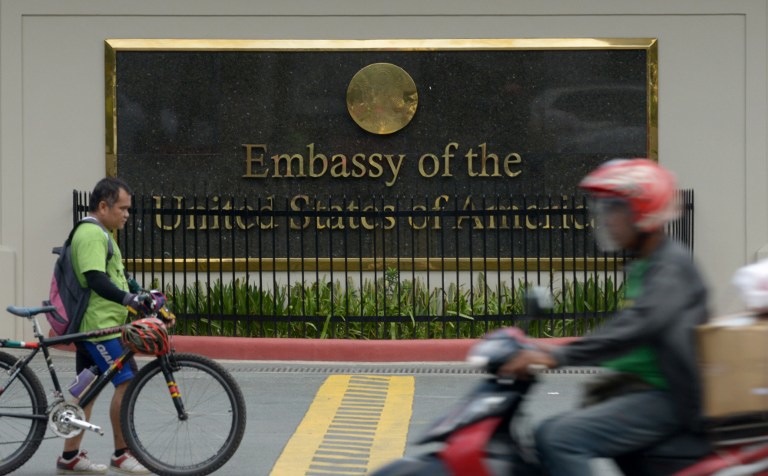SUMMARY
This is AI generated summarization, which may have errors. For context, always refer to the full article.

MANILA, Philippines – The Philippines on Thursday, October 31, said embassies should follow the law in the face of a top-secret map that showed Manila as one of the United States’ “listening posts” for espionage in Asia.
“Functions of embassies are always governed by treaty obligations, especially by the Vienna Convention on Diplomatic Relations,” Department of Foreign Affairs (DFA) spokesman Raul Hernandez said in a text message.
“We expect countries to be guided by the principles in this Convention and to respect the laws and procedures of the host country,” he added.
Hernandez did not directly accuse the US of espionage, and did not elaborate.
Leaked by fugitive intelligence analyst Edward Snowden, the map listed Manila as one of 90 surveillance facilities at embassies and consulates around the world. (READ: Manila a US ‘listening post’ – report.)
The German news magazine Der Spiegel reported this on Tuesday, October 29. It said Washington uses the facilities to monitor communication networks and phone calls.
‘Free communication,’ but…
If the report is true, Article 27 of the Vienna Convention on Diplomatic Relations will likely apply.
Signed in April 1961, the convention says a receiving state “shall permit and protect free communication on the part of the mission for all official purposes.”
A diplomatic mission may “employ all appropriate means, including diplomatic couriers and messages in code and cipher.”
There’s a catch, however.
The convention states that a mission “may install and use a wireless transmitter only with the consent of the receiving State.”
Explaining the convention, international law professor Eileen Denza said the use of wireless transmitters was “probably the most controversial issue” at the Vienna Conference.
“Other States expressed concern that these transmitters might be used for broadcasting local propaganda, and that because they were situated in inviolable premises beyond the control of the receiving State they might lead to breaches of the International Telecommunication Convention,” Denza wrote in a 2009 paper published on the United Nations website.
Francis Vallat, the United Kingdom’s delegate to the Vienna Conference, stated the problem more directly.
Vallat noted fear “that radio transmission might take place in secret, leaving the receiving State with no reasonable means of dealing with any abuse or interference.”
Wiretapping banned
In the Philippines, Republic Act No. 4200 or the Anti-Wiretapping Act prohibits an offense related to espionage – wiretapping.
Signed in June 1965, the Anti-Wiretapping Act makes it “unlawful for any person, not being authorized by all the parties to any private communication or spoken word, to tap any wire or cable, or by using any other device or arrangement, to secretly overhear, intercept, or record such communication or spoken word by using a device commonly known as a dictaphone or dictagraph or dectaphone or walkie-talkie or tape recorder, or however otherwise described.”
The law adds: “It shall also be unlawful for any person, be he a participant or not in the act or acts penalized in the next preceding sentence, to knowingly possess any tape record, wire record, disc record, or any other such record, or copies thereof, of any communication or spoken word secured either before or after the effective date of this Act in the manner prohibited by this law; or to replay the same for any other person or persons; or to communicate the contents thereof, either verbally or in writing, or to furnish transcriptions thereof, whether complete or partial, to any other person.”
While the Philippines has spared the US from wiretapping accusations, at least one Asian country “strongly” protested the issue on US “listening posts.”
“Indonesia cannot accept and protests strongly over the report about wiretapping facilities at the US embassy in Jakarta,” Indonesian Foreign Minister Marty Natalegawa said in a statement.
“If confirmed, such action is not only a breach of security, but also a serious breach of diplomatic norms and ethics and certainly not in the spirit of friendly relations between nations.”
Natalegawa said the issue had been raised with the US charge d’affaires in Jakarta.
There was no immediate comment, however, from the US embassy in Jakarta.
The anger in Asia will heap further pressure on the US as it seeks to placate European nations over the spying claims. (READ: US spy chief defends spying on foreign leaders.) – with reports from Agence France-Presse/Rappler.com
Add a comment
How does this make you feel?
There are no comments yet. Add your comment to start the conversation.